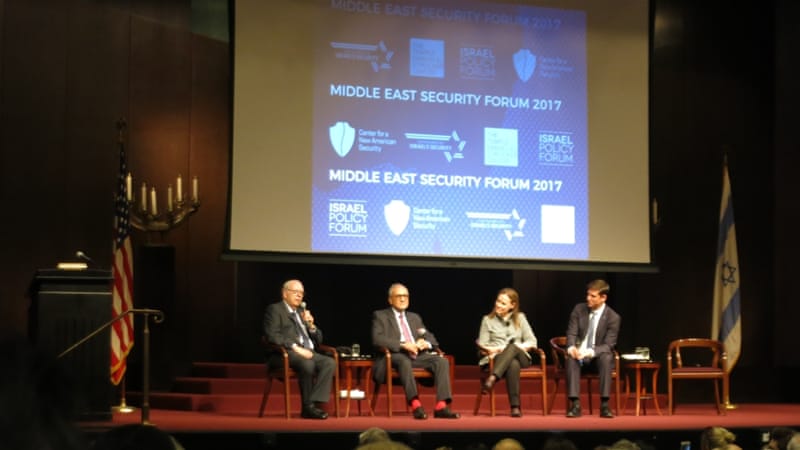A few years back, the prospect of an eminent member of the Israeli political establishment sharing a stage with a Saudi Arabian counterpart in a New York synagogue would have been difficult for many to stomach.
Such events are becoming more common. On Sunday, Prince Turki al-Faisal, a former Saudi intelligence chief appeared relaxed and chatty beside Efraim Halevy, the director of Mossad from 1998-2002, on a podium in Manhattan’s Upper East Side.
Al-Faisal dismissed the idea that Israel and Saudi are edging towards détente, but his many references to Iran’s nuclear arms scheme and growing regional clout underscored the perceived common threat shared by both countries.
But the fear of nuke-toting Iranian religious scholars would not propel Riyadh into clandestine military cooperation with Israel unless the Jewish state first struck an equitable, two-state peace deal with Palestinians, al-Faisal insisted.
“There is no such under-the-table engagement between Israel and these Arab countries. What is needed is on the table, not under-the-table,” al-Faisal, wearing a pinstripe suit, told the Middle East Security Forum: New York.
Nevertheless, observers at the one-day event noted how the joint public appearance of the former Saudi and Israeli intelligence chiefs showed warming ties between the two countries, while raising tough questions for Palestinians.
“No one should underestimate the ways in which the common Iranian threat and recognition that the Israeli-Palestinian conflict is not the destabilisation centre of gravity have changed the region,” Michael Koplow, an analyst at the Israel Policy Forum, the organiser, told Al Jazeera.
“It should not be remarkable to see former Israeli and Saudi spymasters sharing a stage, yet it is a sign of how both sides are slowly allowing what has been a behind-the-scenes relationship to emerge in small ways.”
The Iran factor
Some members of the six Sunni Arab members of the Gulf Cooperation Council (GCC), especially Saudi Arabia, accuse Iran of driving sectarianism tensions in Arab countries to build a crescent of influence in the Middle East. Iran, a Shia power, denies this.
Israel shares Arab antipathy towards Iran, viewing Tehran as an existential threat. As the region’s most powerful military with respected intelligence capabilities and close ties with the US, Israel is potentially a key ally against Iran for Arab states.
In a recent sign of shared interests, both Israel and Saudi Arabia congratulated US President Donald Trump after his October 13 speech in which he declared he would not re-certify the 2015 Iran nuclear deal.
Israeli Prime Minister Benjamin Netanyahu noted that Israel agreed with its Arab neighbours and Trump.
“When Israel and the main Arab countries see eye-to-eye, you should pay attention, because something important is happening,” he said earlier this month.
Arab leaders have not publicly made similar comments, but that does not necessarily mean they disagree with Netanyahu.
They face sensitivities within their own countries, where Israel is often viewed with extreme hostility, especially for its occupation of Palestine.
“While the limits of cooperation and public acknowledgement are entirely contingent on the outcome of permanent status negotiations between Israel and the Palestinians, there is no question that both Israel and Saudi Arabia see benefits to a slight public thaw in what has traditionally been a deep freeze between the two sides,” added Koplow.
‘Natural alliance’
Trump visited the Middle East in May, travelling from Saudi Arabia to Israel in a rare direct flight between the two nations. After touching down in Israel, he spoke of “really good feeling towards Israel” in the Kingdom.
Israeli and some Arab media outlets have been rife with speculations that Saudi’s powerful Crown Prince Mohammed bin Salman made a secret visit to Tel Aviv in September for talks with Netanyahu and other senior Israeli officials.
Only two Arab states — Egypt and Jordan — have signed peace deals with Israel.
The US has promoted links between Israel and the Arab world, with Trump’s administration trying to leverage regional interests to reach an Israeli-Palestinian peace deal.
Formal recognition of Israel by other Arab states is not likely anytime soon, but cooperation has increased, reports suggest.
A rapprochement would mark a departure from a decades-old policy of Arab countries refusing to deal with Israel until an independent Palestinian state is created.
Joost Hiltermann, author of A Poisonous Affair: America, Iraq, and the Gassing of Halabja, described a “natural alliance” emerging between Israel and Saudi Arabia but warned it would come at the expense of Palestinians.
“They will be the victim of any relationship … it will just put their issue on a back burner,” Hiltermann told Al Jazeera.
Riyadh may tolerate a bad peace deal with the Palestinians to secure Israeli cooperation against Tehran.
Ali Vaez, an Istanbul-based analyst for the International Crisis Group, a think tank, said he spoke regularly with Iranian officials and that they are “not too worried about” about a united front of Israel, Saudi Arabia and its Gulf allies.
Tehran has leverage on Israel-Palestine peace talks and “has the cards to sabotage the process”, Vaez told Al Jazeera.
Meanwhile, cooperation between the governments of Saudi and Israel will “reduce their legitimacy in the eyes of their own population”.
[Source: Al Jazeera]





 WhatsApp us
WhatsApp us 


1 comment
the saudis have never worked in favour ofr the palestinians regarding the occupation of their land nor their oppression by the israelis…..
whilst this longstanding behind the scenes but now new open slowly creeping relationship may appear to be a breakthrough for the troubled area the palestinians should be wary of short-term gains through arab nationalism…
the palestiniands burnt their fingers with them being led with carrot and stick into an alliance with the saudis turkey alnusra and isis against the legitimate syrian government…
besides jordan, syria was the only arab country to have afforded the palestinians refuge…
lets hope the palestinians will not be led by the nose so easily this time…